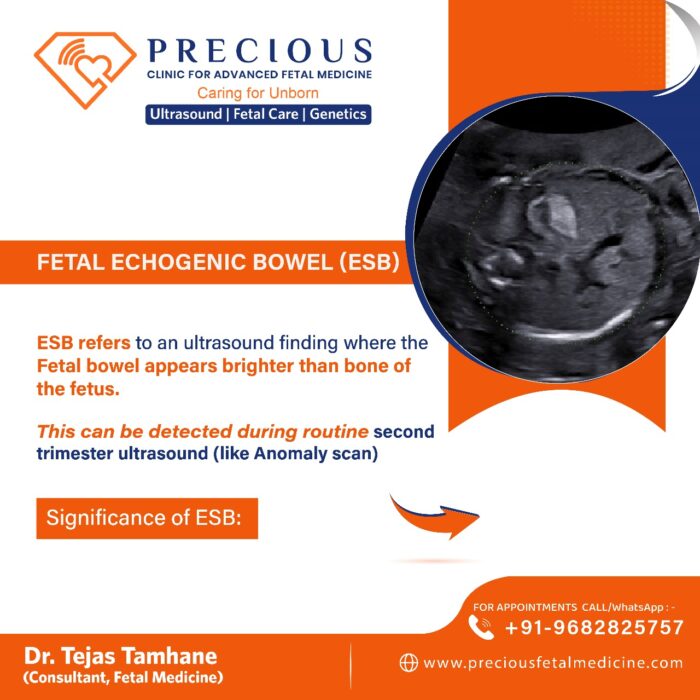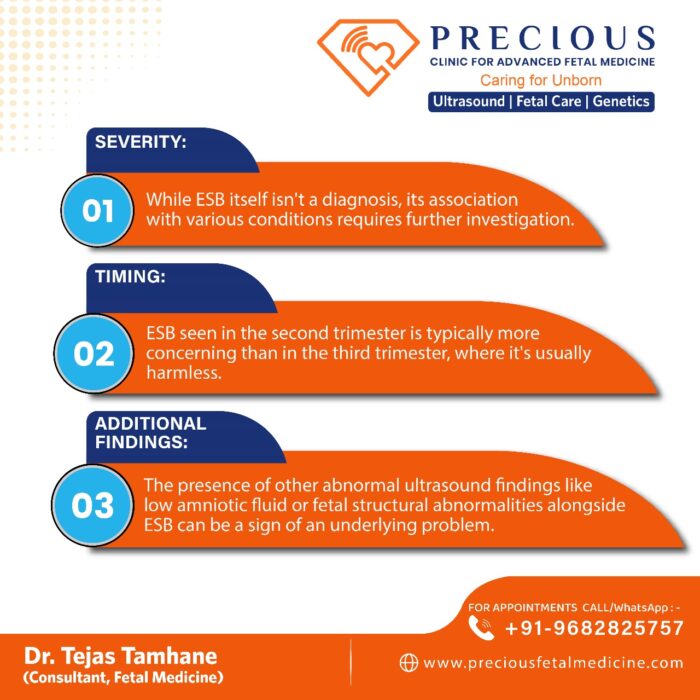Prenatal ultrasound examinations are essential for tracking the fetus’s growth and health. Expectant parents and medical professionals can both benefit from these scans’ insightful results. Unexpected results, such as echogenic small bowels, can occasionally cause alarm, though. We’ll explore the definition of echogenic bowel, possible causes, and what to do if an ultrasound reveals this issue.
Understanding Echogenic Small Bowels:
Echogenic small bowels refer to an ultrasound finding where the fetal bowel appears brighter than surrounding tissues. This is usually relevant during the second-trimester scan (like an Anomaly scan). In this ultrasound, tissues and organs reflect sound waves differently, creating varying shades of grey. Echogenicity is a measure of how easily a structure reflects these waves. When the bowel is more echogenic, it appears whiter on the ultrasound image. Remember, this echogenicity of the bowels should be equal to or more than that of the bone to call it ‘abnormal’.


For expert guidance on Echogenic Small Bowels, contact Dr Tejas Tamhane in Pune.
Potential Causes of Echogenic Small Bowels:
- Genetic Condition: Chromosome abnormalities like Down syndrome have been related to echogenic bowel syndrome. However, it’s important to note that an isolated finding of the echogenic bowel does not definitively indicate a chromosomal abnormality and further testing is usually required.
- Blood Swallowed by the Fetus: If there is placental or decidual bleeding into the amniotic fluid (water around the fetus) and when such fluid is ingested by the fetus, then the bowels can appear echogenic.
- Cystic Fibrosis: A condition that affects the lungs and digestive tract, cystic fibrosis is linked to echogenic bowel as well.
- Infections: An echogenic bowel can also be due to infections like cytomegalovirus (CMV) or toxoplasmosis.
- IUGR: This finding can sometimes also be seen when the weight of the baby is less for that period of pregnancy.
- Gastrointestinal Obstruction: There are multiple reasons for fetal bowel obstruction and this may give rise to the echogenic bowel appearance.
(Also Read: Anomaly Scans in Pune During Pregnancy – Dr Tejas Tamhane (preciousfetalmedicine.com))
What to Do Next:
- Detailed Anatomic Survey: A thorough anatomic assessment is typically carried out to evaluate the general health and development of the fetus if an ultrasound identifies an echogenic bowel. A more thorough inspection of the fetal organs and tissues might be necessary which can be done by an experienced fetal medicine expert. In the majority of the cases, if the echogenic small bowel is isolated, (i.e. if it is not associated with any other issues in the fetus), then this problem usually resolves by the third trimester and the baby will not have any issue after delivery.
- Genetic Counseling and Testing: In light of the correlation between specific genetic conditions and echogenic bowel syndrome, genetic counselling may be extended to enlighten expectant parents about potential risks and available testing alternatives. Chromosome abnormalities may be evaluated by genetic testing, such as amniocentesis.
- Screening for Infectious Diseases: If an infection is suspected, further testing to check for infectious agents may be carried out. The required medical interventions may be started once an infection is verified.

- Follow-up Ultrasound Examinations: Follow-up ultrasound exams are advised by medical professionals to track the progression of the echogenic bowel and spot any possible changes in the bowels and overall abdominal organs over time.
To Conclude:
It is crucial to stress that while an echogenic bowel on ultrasonography can be concerning, it is not always a sign of a major issue. The problem often goes away on its own and the foetus develops normally after that. Comprehensive follow-ups with fetal medicine specialists can help to ensure the best possible outcome for the unborn child and the expectant parents, in addition to extra testing and consultations.
To further comprehend the issue and the next steps, get support from Dr Tejas Tamhane, a renowned fetal medicine expert in Pune.
Echogenic Small Bowels
Reach out to Dr Tejas Tamhane, the best Fetal Medicine Expert in Pune, to guide you through the detection and management of echogenic small bowels.
